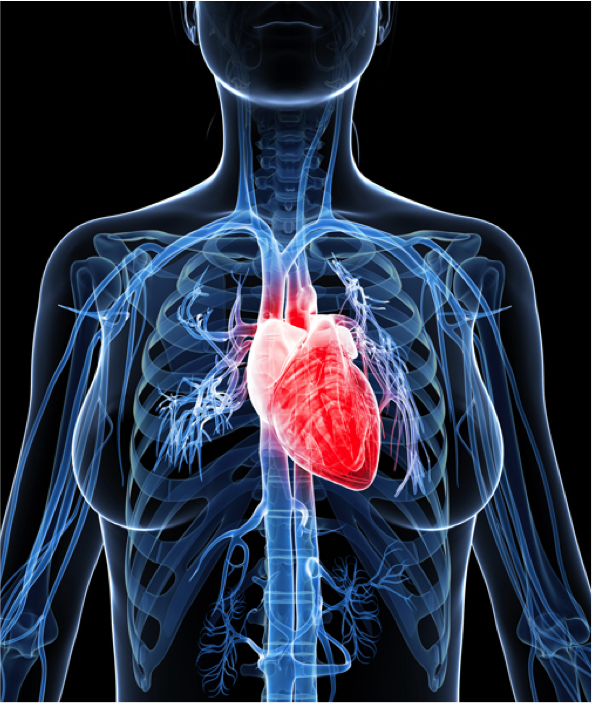Dr. Kirkham’s research program, operating within CODE-W, aims to:
- characterize the intersection of cancer, cardiovascular, and metabolic disease in women and
- quantify the therapeutic benefit of lifestyle interventions including exercise, diet, and multi-modal rehabilitation, to prevent or ameliorate cardiometabolic dysfunction and disease.
Dr. Kirkham’s assessment approach is comprehensive and holistic. While exercise is a key diagnostic and therapeutic tool, she takes a multi-disciplinary approach to characterize, treat, and improve the health of individuals with or at risk for cardiovascular and oncologic diseases. Both established and novel imaging methods are central tools, including magnetic resonance imaging, cardiovascular ultrasound, exercise echocardiography, transcranial Doppler ultrasound, and dual-energy x-ray absorptiometry (DXA). Cardiopulmonary exercise testing and biochemical analyses of blood biomarkers are also widely employed. Other available tools include tonometry (to assess vascular stiffness), BodPod and bioelectrical impedance (to assess body composition), Finapress Nova (to assess resting and exercise hemodynamics), near-infrared spectroscopy (to assess muscle oxygen), accelerometry, continuous glucose monitoring, diet records, cognitive function tests, and patient-reported outcomes.
Intervention approaches of interest include acute and chronic exercise, calorie restriction, intermittent fasting (including time-restricted eating), and multi-dimensional cardiac rehabilitation.
Intervention approaches of interest include acute and chronic exercise, calorie restriction, intermittent fasting (including time-restricted eating), and multi-dimensional cardiac rehabilitation.

Interested in Participating in Research?
We are currently recruiting women with and without a history of breast cancer for several studies.
- Studies of women’s cardiovascular and metabolic health: https://kpe.utoronto.ca/code-w-research
- Studies involving women with a history of breast cancer: https://kpe.utoronto.ca/breast-cancer-research
List of Ongoing Clinical Research Studies:
- IMPACT-Women-Chemo: Impact of Metabolic health Patterns And breast Cancer over Time in Women during Chemotherapy; 2-site (Toronto, Edmonton), 2-arm RCT of novel metabolic health program (time-restricted eating, diet quality, and reduced sedentary time) vs usual care during chemotherapy for early-stage breast cancer. Funded by CIHR.
- IMPACT-Women-Control: Impact of Metabolic health Patterns And breast Cancer over Time in Women in controls; 2-site (Toronto, Edmonton), observational 2-year cohort of changes in cardiometabolic health and influence of lifestyle changes women without cancer or other chronic disease. Funded by CIHR.
- Ms. FIT: Multiple Risk Factor Intervention Trial; 3-arm RCT of 6-months of following the physical activity guidelines alone, the physical activity guidelines and the dietary guidelines, or stretching only among pre and postmenopausal women who have at least 3 cardiometabolic risk factors. Funded by CIHR.
- Ms. FIT-BC: Multiple Risk Factor Intervention Trial in Breast Cancer; 3-arm RCT of 6-months of following the physical activity guidelines alone, the physical activity guidelines and the dietary guidelines, or stretching only among breast cancer survivors completed chemotherapy and at least 12 months of aromatase inhibitor treatment. Funded by CIHR.
- CORE: Cardio-Oncology REhabilitation; Single-arm effectiveness trial of multi-modal cardiac rehabilitation in breast cancer survivors to improve cardiometabolic health.
- TREat-CR: Time-Restricted Eating during Cardiac Rehabilitation; 2-arm RCT of standard cardiac rehabilitation vs standard cardiac rehabilitation + time-restricted eating in women and men with coronary or peripheral arterial disease.
- PACE: Alternative Physical Activity Strategies for Breast and Prostate CancEr Survivors: randomized crossover trial comparing the acute glycemic effects of different types of physical activity (standard brisk walk, exercise snacks, post meal walking, resistance exercise) among breast and prostate cancer survivors on hormonal therapy. Funded by CIHR.
- ESTABLISH: Effects of Sex, eaTing window, And diaBetes on gLycemIc Status and Health; randomized crossover trial of early, mid-day, and late time-restricted eating windows among women and men with obesity and with or at risk for type 2 diabetes. Funded by Diabetes Canada.
- STRIVE (short-term): STudying EndocRine Therapy Impacts on CardioVascular and Brain HEalth Outcomes in Breast Cancer; observational study of the effects of the first 6 months of aromatase inhibitors on cardiovascular and brain health among women with early stage breast cancer. Funded by Cancer Research Society and CIHR.
- STRIVE (long-term): STudying EndocRine Therapy Impacts on CardioVascular and Brain HEalth Outcomes in Breast Cancer; cross-sectional study comparing cardiovascular and brain health among women 1, 5, and 10 years post diagnosis with early stage breast cancer treated with aromatase inhibitors and age and BMI-matched controls. Funded by Cancer Research Society and CIHR.
- TEST: Time-restricted Eating in Survivors Trial; 2-site (Toronto, Edmonton), 2-arm RCT of time-restricted eating with protein counselling vs healthy eating among older breast cancer survivors with elevated cardiovascular risk and mild-moderate cognitive dysfunction. Funded by CIHR.
- RESILIENCE: ImpRoving hEalth behaviourS for LIfe after ENdometrial CancEr; 2-site (Toronto, Edmonton), 2-arm RCT of multimodal digital health intervention to optimize waist circumference, body composition, and cardiometabolic health in endometrial cancer survivors. Funded by CIHR.
Other Research:
The Kirkham Lab also conducts epidemiological research related to the research program aims (currently focussed on the UK Biobank) and basic science (NSERC-funded) research related to validating and optimizing magnetic resonance imaging techniques.
